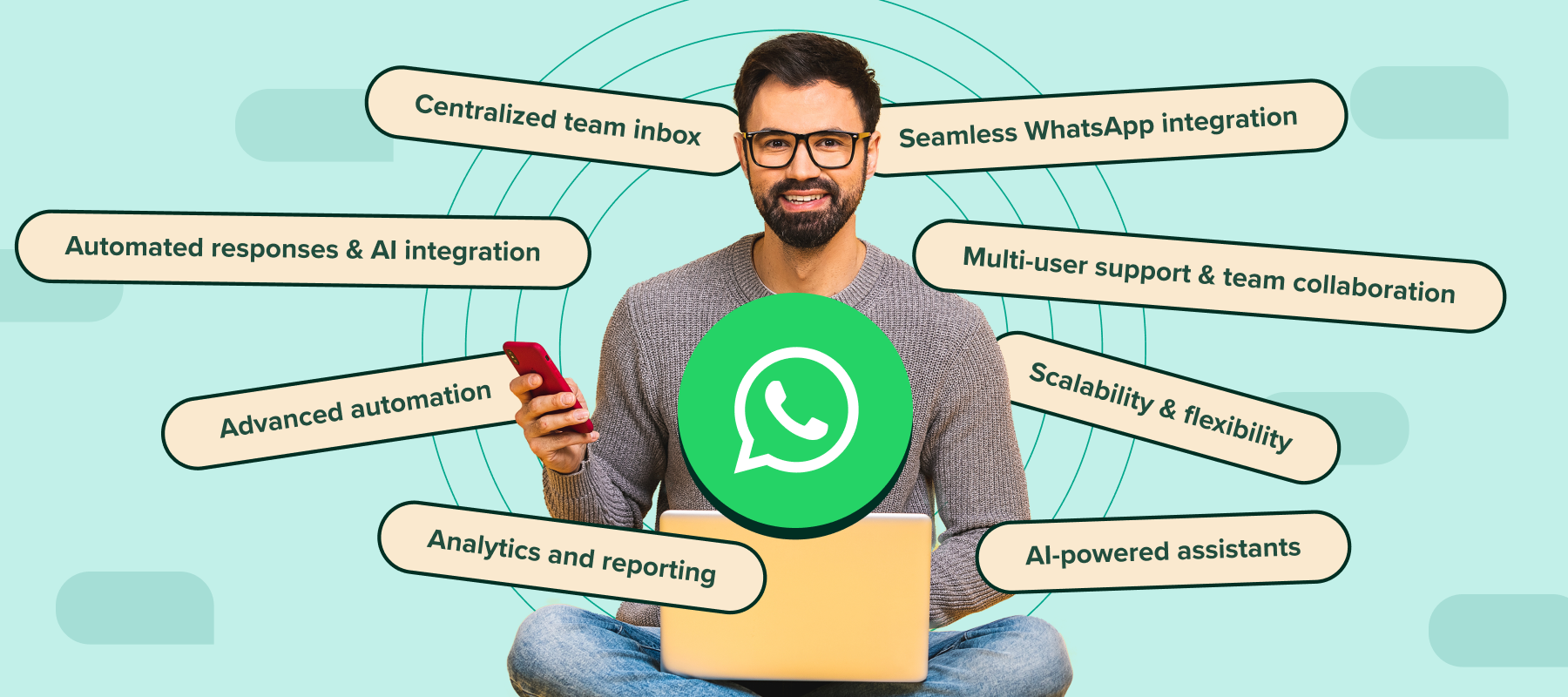As customer preferences continue to shift toward instant and personalized interactions on their terms, businesses must adapt to the new expectations to stay competitive and deliver meaningful experiences. A full-stack WhatsApp CRM solution like Interakt, addresses this by driving automation at scale, analytics, and integration with other business tools, streamlining customer journeys end-to-end. In this article, let’s explore the key features of a WhatsApp CRM solution, future trends, and more.
Is WhatsApp CRM Essential in 2025?
By integrating WhatsApp as a CRM, businesses can instantly respond to customer queries, manage incoming leads in real-time, and provide personalized support that enhances the overall customer experience. Additionally, WhatsApp CRMs can consolidate all communication into a centralized shared team inbox, allowing for seamless collaboration, task delegation, and tracking, ensuring no lead or support ticket goes unnoticed. This level of integration enhances productivity, helps businesses stay competitive, and enables a personalized approach that aligns with customer preferences for instant, timely interactions.
Discover the Secret to Capturing More with Interakt's WhatsApp CRM step-by-step guide
Top Features to Look for in a WhatsApp CRM Solution
When evaluating a WhatsApp CRM solution, businesses should consider several key features to ensure they are selecting a tool that will streamline communication, enhance productivity, and deliver superior customer experiences.
Multi-user support and team collaboration
A WhatsApp CRM solution should support multi-user access, allowing multiple team members to manage customer interactions simultaneously. It enables businesses to create shared workspaces, assign tickets, and collaborate in real-time.
Centralized team inbox
Consolidating all WhatsApp conversations into a single, centralized team inbox simplifies communication management. With this feature, businesses can track all incoming messages, categorize them by urgency or subject, and ensure that customer inquiries are addressed without duplication.
Automated responses and AI integration
Automation is a key part of modern CRM systems. WhatsApp CRMs should help set up automated responses for FAQs, out-of-office messages, and initial greetings, all of which are available on Interakt. AI integration can further optimize this by offering predictive responses or handling simple queries, leaving team members to focus on more complex customer needs.
Analytics and reporting
Analytics tools help businesses evaluate the effectiveness of their customer interactions. WhatsApp CRM solutions should provide detailed reports on response times, engagement rates, customer satisfaction, and overall performance. This data helps businesses identify trends, measure KPIs, and optimize their communication strategies.
Seamless WhatsApp integration
WhatsApp integration with a CRM enables businesses to get a unified view of each customer. This centralization reduces the risk of fragmented data, ensures that support teams are on the same page, and offers a personalized experience.
For example, when a customer messages on WhatsApp, their inquiries, purchase details, or support tickets can be automatically retrieved from the CRM. This allows businesses to quickly pick up the conversation where it left off, improving response times and customer satisfaction.
WhatsApp integration unlocks a variety of use cases. eCommerce businesses can use WhatsApp to send order updates, while automatically logging all interactions into their CRM for further follow-up and marketing. Similarly, service-based businesses can receive service requests or inquiries through WhatsApp and track the entire customer journey in their CRM, from the initial query to resolution and follow-up.
By choosing the right WhatsApp CRM software that offers smooth integration, businesses can scale and manage customer relationships effectively in 2025 and beyond.
Analytics and reporting
Analytics in WhatsApp CRM tools give businesses the ability to track how users interact with their messages in real-time. These insights include metrics such as message open rates, clickthrough rates (CTR), and response times. With analytics, companies can monitor campaign performance, identify engagement trends, and adjust strategies accordingly. For instance, retailers could track how many customers opened their promotional WhatsApp message and clicked on product links, allowing them to optimize future campaigns.
One valuable aspect of analytics in a WhatsApp CRM is customizing reports to meet specific business needs. Businesses can create tailored reports based on KPIs that matter most to them. A travel agency might want to see detailed reports about how many leads were converted into bookings through WhatsApp, or a healthcare provider might focus on the volume of appointment reminders sent and customer follow-ups.
Scalability and flexibility
As your business grows, the volume of customer interactions increases. A WhatsApp CRM platform ensures you can scale operations without a proportional increase in manual resources, making it easier to grow your business while delivering quality customer service.
For example, large brands like Coca-Cola or KLM Airlines have integrated WhatsApp for customer service, highlighting the platform’s scalability to handle exponentially high volumes of messages and interactions simultaneously. This scalability ensures businesses maintain consistent, high-quality communication without overwhelming customer service teams.
WhatsApp CRM can be linked with email, social media, live chat, and even offline touchpoints like call centers. The omnichannel capability allows businesses to have a unified customer engagement strategy where all customer data and conversations are available in a centralized platform.
By allowing businesses to handle higher volumes of messages, integrate with existing systems, and personalize customer interactions, WhatsApp CRM is a vital tool for businesses looking to scale their customer engagement efforts while being efficient and keep costs low in 2025.
AI-powered assistants
By leveraging AI chatbots and virtual assistants, businesses can offer always-on support to customers by resolving queries and personalizing assistance throughout their journey. To start with, AI assistants can help qualify leads by engaging with potential customers, gathering key information, and categorizing them based on needs and behaviors. This is typically valuable for businesses in sectors like real estate, eCommerce, or fintech services, where early understanding of customer intent early can significantly improve conversion rates.
AI-powered assistants empower businesses to proactively engage customers, reaching out with timely information, reminders, or personalized offers. Using machine learning algorithms, AI can predict the best times and channels to reach out to customers for maximum engagement.
Multilingual support is another key feature of AI-powered assistants, helping break down language barriers and support customers in their preferred language. This feature is especially crucial for international businesses with a diverse customer base. Interakt supports 135 languages, including mixed languages such as Hinglish and Spanglish.
Future Trends in WhatsApp CRM
As customers demand richer interactions, voice and video messaging will become more integral to WhatsApp CRM. Businesses will be able to interact with customers not just through text but with voice notes, video calls, and interactive media. This trend is likely to see greater adoption, especially in sectors like real estate, travel, and healthcare, where visual explanations can enhance the customer experience.
WhatsApp CRMs will increasingly be used to collect real-time feedback through automated surveys, sentiment analysis, and other tools, allowing businesses to make instant adjustments to their customer service strategies. By continuously gathering and analyzing customer feedback, businesses can identify pain points and address issues quickly, ultimately improving the overall customer experience.
As businesses continue to focus on personalization, the integration of WhatsApp CRM with customer data platforms (CDPs) will become more common. This will enable businesses to create a 360-degree customer profile, allowing for hyper-targeted messaging at scale.
Conclusion
The future of WhatsApp CRM lies in its ability to integrate cutting-edge technologies and support dynamic, omnichannel strategies that keep businesses ahead of the curve. In 2025 and beyond, businesses that implement these best-in-class CRM features will be best placed to thrive in an increasingly competitive landscape. WhatsApp CRM is increasingly about creating meaningful, lasting relationships with customers for long-term success.








